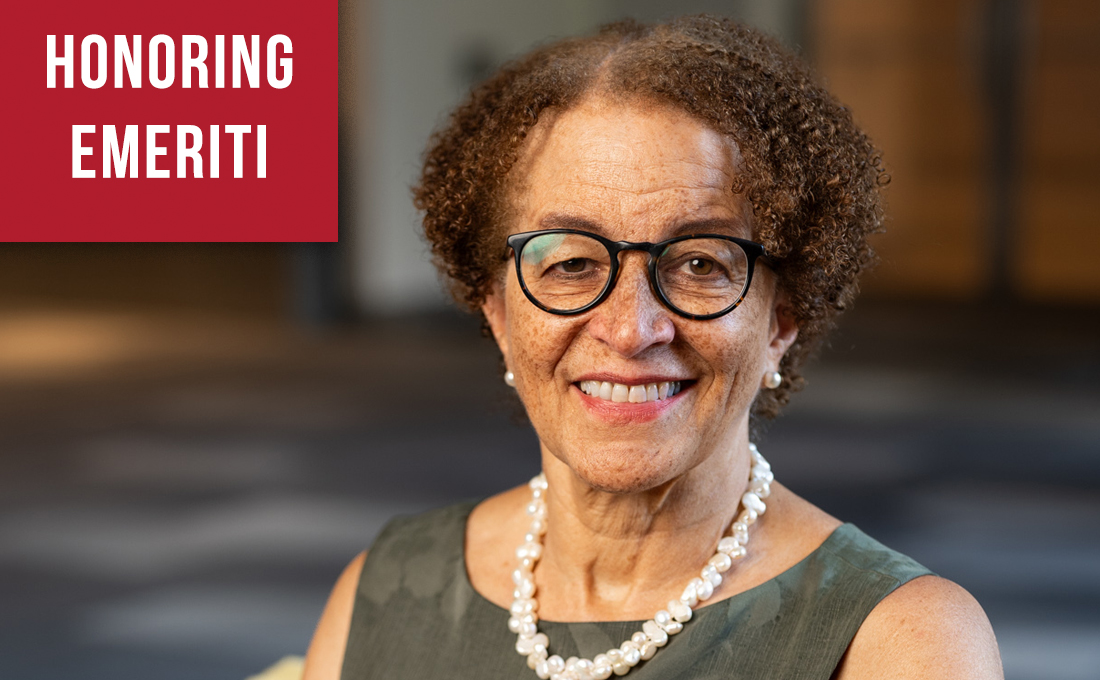Beryl Jones-Woodin: Practicing the Art of Law and the Law of Art

At the end of the Spring 2023 semester, three of Brooklyn Law School’s respected professors —Beryl Jones-Woodin, Larry Solan, and Winnie Taylor—announced their retirement. As innovators, scholars, teachers, and colleagues, each has made an enormous impact on our Law School community. Here, we take a look at Professor of Law Emerita Beryl Jones-Woodin.
Since joining the Brooklyn Law School faculty to teach property, copyright, and art law in 1984, Professor Beryl Jones-Woodin has witnessed dramatic changes in her field.
“In art and copyright law, there are always new and different areas of inquiry,” Jones-Woodin said. “That’s what continues to make it interesting and intellectually challenging. When I started my career, computers and computer programs didn’t play the role they do now, entwined in everyday existence. Today, with artificial intelligence (AI), there are questions like, ‘Who owns the work created by an AI program?’ These issues need to be addressed in significant ways.”
In addition to sharing her great enthusiasm and expertise in her Brooklyn Law School classes (which also included international intellectual property and professional responsibility), Jones-Woodin has given students real-world experience, taking them into the field to meet with general counsel at museums such as Philadelphia’s Barnes Foundation and New York auction houses such as Christie’s. In yearly Art Law Seminars, she has explored the ways in which the law regulates the creation of art, the cultural implications of art, and the art market, including moral rights, fair use, museum law, cultural property law, and rights of privacy.
She has also provided legal advice to museums, including the Brooklyn Museum, Frick Collection, Brooklyn Historical Society, Museum of the City of New York, and the Studio Museum; has served as a member of the editorial board of the Journal of the Copyright Society; chaired the Association of American Law Schools’ Art Law Section and its Intellectual Property Section; and been active in the New York City Bar on its committees for art law, communications and media law, and copyright law.
“I really enjoyed teaching and thinking about how to present complex ideas and philosophical and social issues, in a way that people who were smart but not yet analyzing like lawyers could talk and think about the law, to understand the basics as well as the complexities,” Jones-Woodin said.
She has also witnessed—as well as spearheaded—positive changes in the Law School itself.
“When Beryl joined us in 1984, she was one of four women appointed that year and was the Law School’s first African American tenured-track professor,” said Professor Michael Cahill, former President and Joseph Crea Dean. “She has had a profound impact on the Law School and is a fierce advocate for students, and for diversity, equity, and inclusion.”
As a former Dean of Students, a member of the Clerkship Committee, and an advisor to both the Black Law Students Association and Art Law Association, she played a role in guiding diverse students.
“I worked with students of color, with students of different faiths, to enhance their experience and address their concerns about navigating their legal education that may be distinct from others’ concerns,” Jones-Woodin said.
The Community Conversations forums she launched help students to understand and experience the issues of the day and to use their legal training to think through these issues.
“It started with the O.J. Simpson trial, and the conversations still go on today, with discussions such as the recent one that Arthur Pinto & Stephen Bohlen Associate Dean of Inclusion & Diversity and Professor of Legal Writing Joy Kanwar led on the Supreme Court affirmative action decision,” Jones-Woodin said.
“What’s been most important to me has been the relationships with students, getting to know them, supporting them, and observing how they have grown and become important members of the legal community,” she said. “I’m very lucky to have spent my years at Brooklyn, with incredibly smart and interesting people as colleagues. It’s been a good ride.”
As far as life after Brooklyn Law, Jones-Woodin said, she isn’t making plans but simply staying open to the possibilities, “to grow intellectually, and to be optimistically engaged with the wider world.”